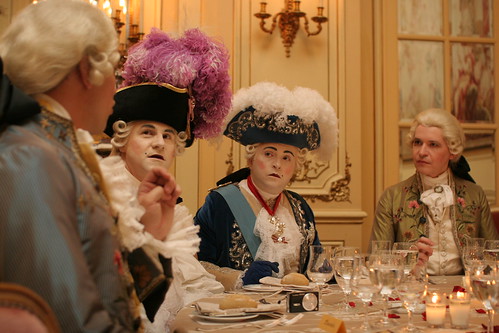The object of Yes Grand Duke is to gain as many points as possible with the player with the most points being declared the winner at the end. The players are members of the Grand Dukes council of advisors an informal group of nobles who advise the Grand Duke on policy. The Grand Duke invariably follows the majority decision of the council.
Interest Cards
Each player begins the game with a number of Interest Cards. Each card represents an interest or agenda the player wishes to pursue and can be positive or negative. The various interests a player can have are listed below and are described in full on the Interest Sheet.
Ducal Power
Military
Agriculture
Trade
Church
A well ordered Treasury
Enlightenment
Foreign Prestige
Peasantry
Tax Revenue
Game Play
Yes Grand Duke is made up of rounds of table discussion, free discussion and voting. In table discussion the Grand Duke will describe the problems besetting the Duchy to the players, who will then discuss, bicker and connive with each other and then present their views to the Grand Duke in a round of voting. The Grand Duke will follow the majority view and every so often the Ducal Chamberlain will give the results of the councils deliberations.
Example: After discussion, the Grand Duke authorises limited conscription. This is a move that benefits Military and Foreign Prestige as it gives him a large standing army and convinces foreign powers that Little Siskington is not to be messed with. It hurts A well order Treasury as you have to pay for all those uniforms, muskets and such and is doubly unpopular with the Peasantry, who rather liked being civilians.
The result of the decision would be Military, Foreign Prestige +1, A well ordered Treasury -1 and Peasantry -2.
Scoring
Players score one point for every bonus to one of their interests and lose one for every penalty. If a player has a negative interest in something, he gains a point for every penalty to that interest and loses one for every positive development.
Example: A player who had three Interest Cards reading; Military, Church and Peasantry (negative) would do very well out of the example above, gaining a point for Military, none of Church and two points for a negative interest in Peasantry.
A player may attempt to insure against disaster if he thinks a decision will go against him by making an assertion. An assertion is a publically announced statement which begins, “Grand Duke, I assert that X will happen if Y decision is taken.” The Ducal Chamberlain will indicate if the assertion and if so will make a note of it. If he is proved right, he gains a point and if he is proven wrong by developments, he loses a point.
Players may not show their Interest Cards to each other under any circumstances, but are free to discuss them with others. There are special situations where a player can compel another to disclose a card, but this will be written on a special card.
The Grand Duke must always be addressed as “Your Grace” or “Grand Duke”. He should be referred to as “His Grace”.
Lordly players should be addressed as “My Lord” and should be referred to as “Lord”.
Lady players should be addressed as “My Lady” or “Madam” and should be referred to as “Lady.”
Bishops should be addressed as “My Lord” or “Bishop” and should be referred to as “The Right Reverend”.
No-one may sit while the Grand Duke stands.
No Lord or Bishop may sit while in conversation with a Lady who is standing.
Any Lord, excepting the Bishops, who is unmarried at games end will lose three points.
A Bishop gains one point for every marriage he solemnizes.
Ladies may bring their wit and amiability to the deliberations of the council, but they may not vote.
Lords may challenge each other to a duel, losing a duel gains the loser a point and he forfeits the right to vote in the next round. The winner gains two points. Duelling is not for the faint hearted.










































sounds interesting.
ReplyDelete-- Jeff